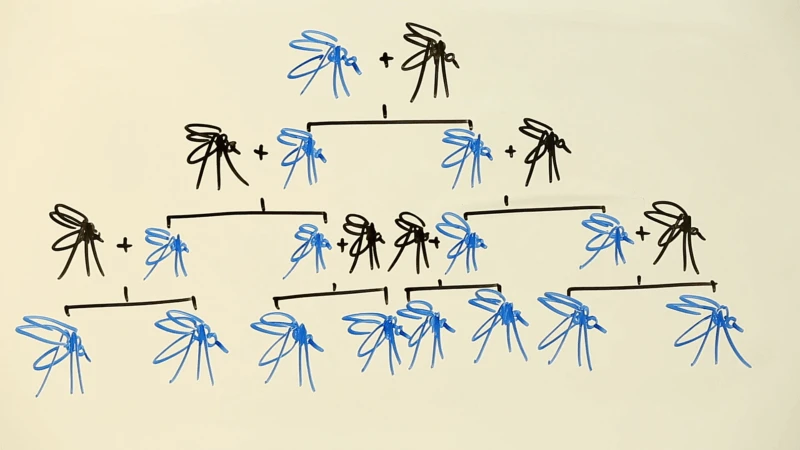240 million people suffer annually from malaria. Could deploying CRISPR to gene edit mosquitoes’ pesticide resistance contain the scourge?
240 million people suffer annually from malaria. Could deploying CRISPR to gene edit mosquitoes’ pesticide resistance contain the scourge?


Insecticides kill off most of the mosquitoes in an area. But a small number may survive because something about their genetic makeup makes them unaffected by the pesticide. Mosquitoes within that small population mate with each other and pass on their genes to their offspring, breeding more resistant mosquitoes. In some cases, resistance has built up just a few years after the introduction of an insecticide.
…
Researchers at UC San Diego and the Tata Institute for Genetics and Society in India have developed a potential way to fight back: Using Crispr gene editing, they replaced an insecticide-resistant gene in fruit flies with the normal form of the gene and propagated the change through insects in the lab.
The approach, known as a gene drive, is described in a January 12 paper in Nature Communications, and the team believes it can be translated into mosquitoes.
Lab tests of gene drives have shown that it’s possible to spread a desired genetic trait through several generations. But studies have also found that resistance to gene drives can emerge because some mosquitoes don’t inherit the desired trait. In the wild, resistance is almost certain to occur, meaning that gene drives would probably still leave behind some mosquitoes that could bite humans and transmit disease.
This is an excerpt. Read the original post here.

 | Videos | More... |

Video: Nuclear energy will destroy us? Global warming is an existential threat? Chemicals are massacring bees? Donate to the Green Industrial Complex!
 | Bees & Pollinators | More... |

GLP podcast: Science journalism is a mess. Here’s how to fix it

Mosquito massacre: Can we safely tackle malaria with a CRISPR gene drive?

Are we facing an ‘Insect Apocalypse’ caused by ‘intensive, industrial’ farming and agricultural chemicals? The media say yes; Science says ‘no’
 | Infographics | More... |

Infographic: Global regulatory and health research agencies on whether glyphosate causes cancer
 | GMO FAQs | More... |

Why is there controversy over GMO foods but not GMO drugs?

How are GMOs labeled around the world?

How does genetic engineering differ from conventional breeding?
 | GLP Profiles | More... |

Alex Jones: Right-wing conspiracy theorist stokes fear of GMOs, pesticides to sell ‘health supplements’




 Viewpoint — Fact checking MAHA mythmakers: How wellness influencers and RFK, Jr. undermine American science and health
Viewpoint — Fact checking MAHA mythmakers: How wellness influencers and RFK, Jr. undermine American science and health Viewpoint: Video — Big Solar is gobbling up productive agricultural land and hurting farmers yet providing little energy or sustainabilty gains
Viewpoint: Video — Big Solar is gobbling up productive agricultural land and hurting farmers yet providing little energy or sustainabilty gains Trust issues: What happens when therapists use ChatGPT?
Trust issues: What happens when therapists use ChatGPT? Fighting deforestation with CO2: Biotechnology breakthrough creates sustainable palm oil alternative for cosmetics
Fighting deforestation with CO2: Biotechnology breakthrough creates sustainable palm oil alternative for cosmetics California, Washington, Oregon forge immunization alliance to safeguard vaccine access against federal undermining
California, Washington, Oregon forge immunization alliance to safeguard vaccine access against federal undermining 30-year-old tomato line shows genetic resistance to devastating virus
30-year-old tomato line shows genetic resistance to devastating virus The free-range chicken dilemma: Better for birds, but with substantial costs
The free-range chicken dilemma: Better for birds, but with substantial costs ‘You have to treat the brain first’: Rethinking chronic pain with Sanjay Gupta
‘You have to treat the brain first’: Rethinking chronic pain with Sanjay Gupta
